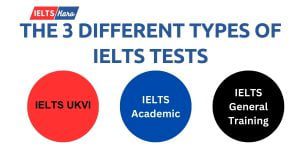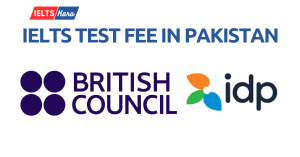Understanding the IELTS Band Scores
The IELTS band scores is a scale upon which the IELTS tests its candidates. It is on a scale from 1 to 9, with each band representing a specific level of English proficiency. This scale helps institutions and organizations understand a candidate’s ability to communicate effectively in English. The higher the band score, the higher the English level proficiency.
How the IELTS Band Scores are Calculated?
Each section of the IELTS—Listening, Reading, Writing, and Speaking—is scored separately. The individual scores are then averaged to produce an overall band score. It’s a precise system designed to provide a clear picture of a candidate’s strengths and weaknesses.
- Overall IELTS scores are always calculated to the nearest decimal. For example, if your band score comes out to be 6.75, then it will be rounded off to 7.0. Similarly, it comes out to 6.15, it will be rounded off to 6.
- My scores in Listening, Reading and Writing were 8.5 each, and in Speaking was a 7.5. The overall average was an 8.25, and it was rounded off to an 8.5. This shows that IELTS will automatically push you to the next band if your score is a perfect average.
- Your score will always round up or down to the nearest 0.5, as evident from the personal examples above.
Planning to Move to Canada?
Your IELTS band score isn’t just a number—it’s CRS points that determine your entire Express Entry timeline.
Quick Reality Check:
- Band 6.0 (CLB 7) = Minimum eligible = 68 language points
- Band 7.0+ (CLB 9) = Competitive = 124 language points
- That’s 56 points difference from improving just 1 band level
And those 56 points? They could mean getting your ITA in 3 months versus waiting 2 years.
Not sure what score you need? Read our complete guide: What is a Good IELTS Score for Canada Express Entry?
We break down the exact IELTS bands required for your profile, how CLB conversion works, and how to calculate your CRS score accurately.
The band scores for Speaking and Writing have a different criteria. Here are some links to speaking and writing marking criteria that will give you a clearer picture of how the examiners assess and mark writing and speaking:
Listening Band Scores
How is the Listening Band Score Calculated?
Each correct answer in the listening test is awarded one mark, and the total number of correct answers is converted into a band score. This ensures a standardized measure of your listening skills. There is no negative marking.
Tips to Improve Listening Scores
- Practice Regularly: Listen to English podcasts, watch movies, and engage in conversations.
- Take Notes: Develop your note-taking skills to capture key points quickly.
- Understand Accents: Familiarize yourself with various English accents to improve comprehension.
The table below highlights the band scores at each level of correct answers. Your band scores are calculated based on the correct answers out of 40 questions. The marking criteria for Listening GT and Academic is the same. Here is the table:
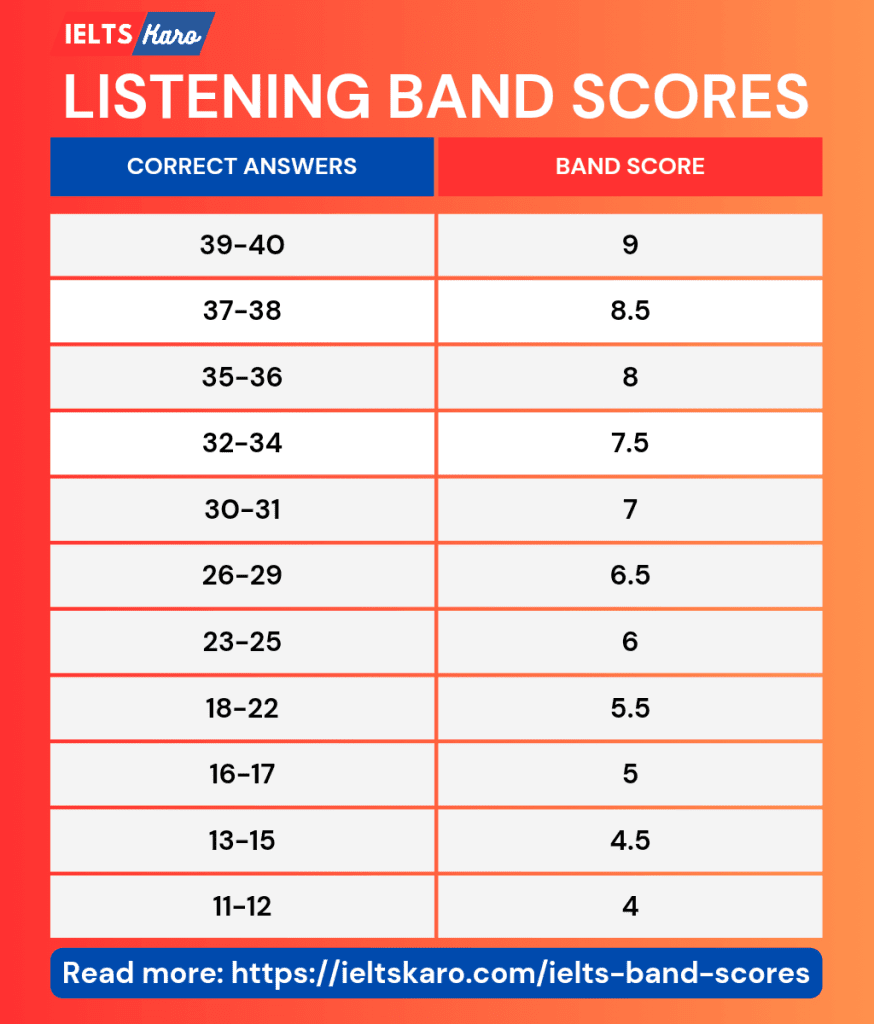
Reading Band Scores
How is the Reading Band Score Calculated?
Similar to the listening test, each correct answer is worth one mark. The total correct answers are converted into a band score out of a total of 40 questions, reflecting your reading comprehension skills. Similar to the Listening Module, there is no negative marking.
Tips to Improve Reading Scores
- Read Widely: Explore different genres and topics to enhance your reading speed and understanding.
- Skim and Scan: Learn to quickly locate information and key details within texts.
- Practice with Timed Tests: Use practice tests to get accustomed to the exam’s timing and pressure.
The table below shows the band scores based on the right answers from a total of 40 questions. There is a variation in the IELTS Academic and the IELTS General Training Reading modules. Hence, there is a difference in marking criteria.
While slightly more difficult, the Academic Reading has a relaxed marking criteria, giving you more room for a higher band score. Similarly, even though the General Training has easier reading passages as compared with the Academic Reading, the marking criteria is strict, which means you have less room in achieving a higher band score.
Here is the table for IELTS Academic Reading band scores:
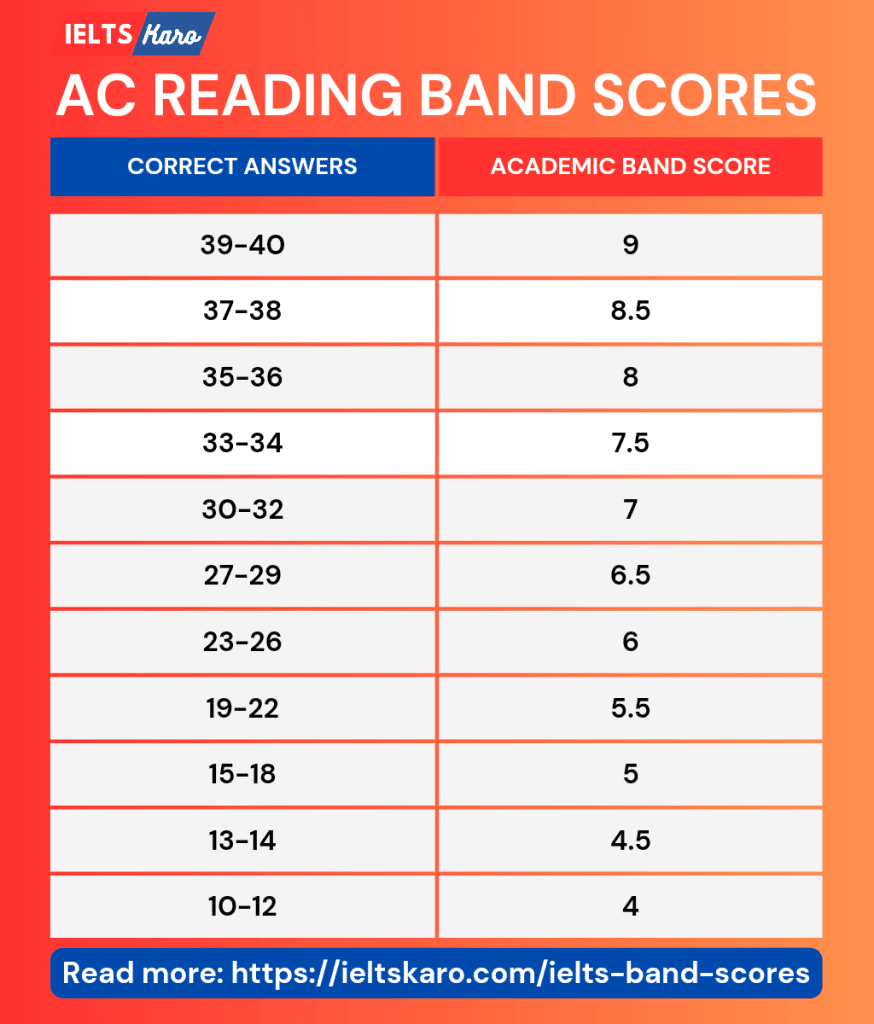
Here is the table for IELTS General Training Reading Scores:
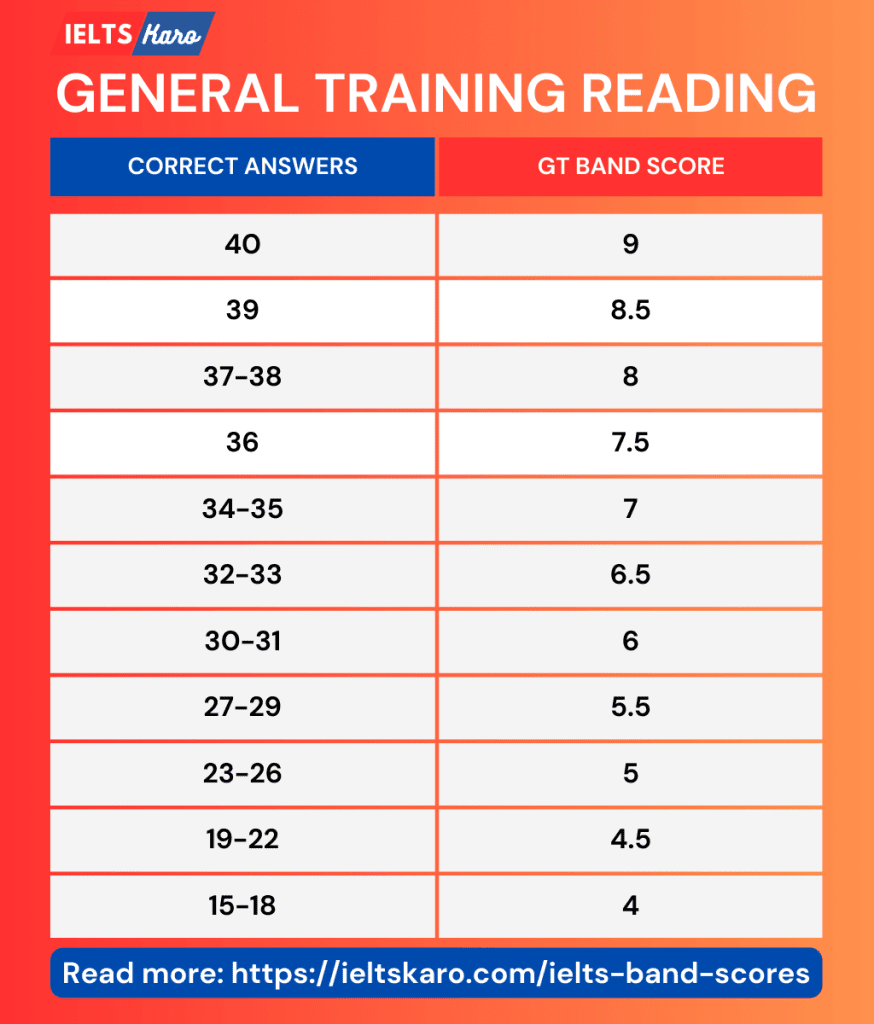
Writing Band Scores
How is the Writing Band Score Calculated?
Examiners assess your writing based on four criteria: task achievement, coherence and cohesion, lexical resource, and grammatical range and accuracy. Each criterion contributes to your overall writing band score.
There is no table that can easily explain how the writing band score is calculated because there are no questions unlike Reading and Listening. It is all about how well-organized, well-written, well-structured, and to-the-point your content is. The higher the quality of your written content, the higher would be the band score!
Tips to Improve Writing Scores
- Plan Your Essays: Spend time planning before you start writing to ensure a clear structure.
- Expand Your Vocabulary: Use a wide range of vocabulary appropriately to enhance your writing.
- Practice Regularly: Write essays and get feedback to continually improve your skills.
Speaking Band Scores
How Speaking is Scored
Examiners score the speaking test based on fluency and coherence, lexical resource, grammatical range and accuracy, and pronunciation.
Tips to Improve Speaking Scores
- Practice Speaking: Engage in conversations in English as much as possible.
- Record Yourself: Listen to your recordings to identify areas for improvement.
- Expand Your Vocabulary: Use a variety of words and phrases to express your ideas clearly.
IELTS Overall Band Score
How Overall Band Scores are Calculated
Your overall band score is the average of your four individual scores, rounded to the nearest whole or half band. For example, if your scores are 7.5, 8.0, 6.5, and 7.0, your overall band score would be 7.25, which rounds up to 7.5.
What Overall Band Scores Mean
Each overall band score corresponds to a level of English proficiency, from non-user (band 1) to expert (band 9). This score gives a comprehensive view of your ability to use and understand English in various contexts.
Interpreting Your Band Scores
What Each Band Score Represents
- Band 1: Non-user
- Band 2: Intermittent user
- Band 3: Extremely limited user
- Band 4: Limited user
- Band 5: Modest user
- Band 6: Competent user
- Band 7: Good user
- Band 8: Very good user
- Band 9: Expert user
Band Score Descriptors
Each band score comes with detailed descriptors that explain what a candidate can do at that level, providing a clear benchmark for skills and abilities.
IELTS Score Requirements
Academic vs. General Training Requirements
The IELTS offers two versions: Academic and General Training. The Academic version is typically required for higher education and professional registration, while the General Training version is for those migrating to an English-speaking country or applying for secondary education.
Score Requirements for Universities and Employers
Different institutions and employers have varying score requirements. It’s crucial to check the specific requirements of the organization you’re applying to. Generally, top universities may require a score of 7.0 or higher.
Common Misconceptions about IELTS Scores
Myths about the Band Scale
There are several myths about IELTS scores, such as needing a perfect 9 in all sections to succeed. In reality, requirements vary widely depending on your goals.
Clarifying Common Confusions
It’s important to understand that the IELTS is a measure of overall proficiency, not perfection. Even native speakers may not achieve a perfect score in every section.
Improving Your IELTS Band Score
Study Strategies
Effective study strategies include setting realistic goals, focusing on weaker areas, and using varied resources to keep learning interesting and engaging.
Practice Tests and Resources
Utilize practice tests to familiarize yourself with the test format and identify areas for improvement. There are many online resources available, including official IELTS materials.
Time Management Tips
Time management is crucial during the IELTS test. Practice managing your time effectively during preparation to avoid running out of time during the actual test.
IELTS Preparation Courses
Benefits of Preparation Courses
Preparation courses offer structured learning, expert guidance, and regular feedback, which can significantly improve your band score.
Choosing the Right Course
When selecting a course, consider factors like the reputation of the institution, the experience of the instructors, and the feedback from past students.
Self-Study Tips for IELTS
Creating a Study Plan
A well-structured study plan helps keep your preparation on track. Allocate specific times for each section of the test and stick to your schedule.
Utilizing Online Resources
There are numerous online resources available, from practice tests to instructional videos. Use these to complement your study plan and gain different perspectives on test strategies.
Dealing with Test Anxiety
Techniques such as deep breathing, visualization, and mindfulness can help manage test anxiety. It’s also important to stay positive and confident.
Ensure you get adequate rest and maintain a healthy diet, especially as the test date approaches. A well-rested mind performs better under pressure.
Conclusion
Preparing for the IELTS can be a daunting task, but understanding the band scores and how they are calculated can make the process easier. Focus on improving your skills in each section, utilize available resources, and practice consistently. Remember, achieving your desired band score is within reach with the right preparation and mindset.
FAQs
How long are IELTS scores valid?
IELTS scores are valid for two years from the date of the test.
Can I retake the IELTS test if I’m not satisfied with my score?
Yes, you can retake the IELTS test as many times as you wish. However, it’s advisable to prepare thoroughly before each attempt.
How soon can I retake the IELTS test?
You can retake the IELTS test whenever you feel ready. There are no restrictions on the number of attempts or the time between attempts.
Do all institutions accept both Academic and General Training IELTS scores?
No, institutions usually specify which version of the IELTS they require. It’s important to check their specific requirements before applying.
How can I verify the authenticity of my IELTS score?
You can verify your IELTS score by using the TRF (Test Report Form) number on the official IELTS website.



